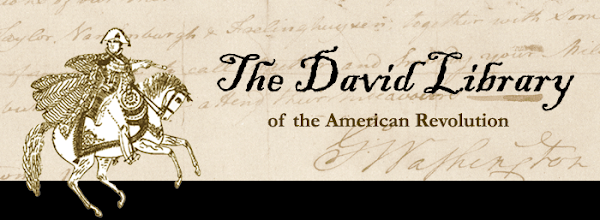Guest blogger Dusty Marie Dye is a PhD candidate at the University of Maryland. During her residency as a 2018-19 David Library Fellow last summer, she came across some passages in orderly books, correspondence and diaries that were both insightful, and strange.
My fellowship at the David Library
of the American Revolution lasted for the month of June, 2018, and I have to
say it is one of the best experiences of my scholarly career. It goes without
saying that I was tremendously excited to have the extensive collection at the
library at my fingertips on a 24/7 basis, but I could not have expected how amazing
my discoveries would be. My dissertation focuses on eighteenth-century mourning
customs and how those customs give us insight into the lives of the soldiers
and civilians who experienced the turmoil of the American Revolution, the
separation of Great Britain from its North American colonies, and the formation
of an entirely new nation with citizens who struggled to develop new national
identities. With such a peculiar starting point, I have had to be creative in
the sources that I have employed to examine my subject and the collection at
the library has been an absolute treasure of valuable (and sometimes quirky)
information. I found, for example, instructions in an orderly book for New York
soldiers to “furnish 3 Sargts & 30 privates to Burrey the dead bodys &
carkesses & cover the other putred matters” in and around Yorktown in
October 1781. In addition, I found sheet music for funeral dirges and an
officers’ handbook (Thomas Simes' Military
Guide for Young Officers) that listed, in detail, the order that soldiers
should march in funeral processions, what the usual funeral expenses should be,
and what should be done with a fallen soldier’s belongings, whether he be an
officer or a “common soldier.” As for civilians, the personal papers and
diaries that can be found at the library are awash with accounts of attending
funerals and lamentations on the deaths of loved ones and friends, including
fears for those marching off to battle and consolations to others who lost
family members to the war.
 |
| Page from Simes' Guide |
In the course of my research, I also found other insights into military life, such as when orderly books included prohibitions against soldiers throwing apples at one another or lounging about naked after bathing. There were frequent reminders that the soldiers who fought the Revolution were ordinary men and boys, such as when they noted in their diaries that they missed their families or relieved their boredom by doodling in the margins of orderly books.
 |
| A doodle in the margin of an orderly book |

